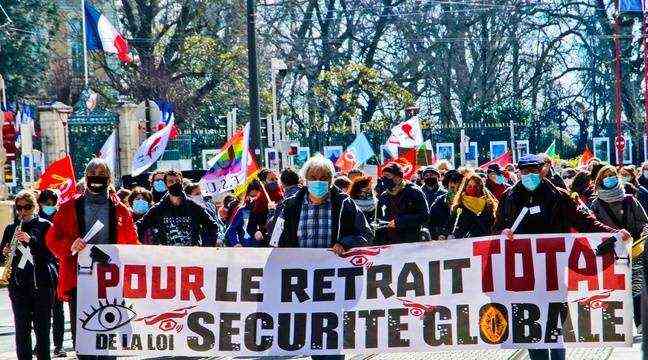Demonstration against the comprehensive security law, March 20 in Le Mans. – GILE Michel / SIPA
- After the final adoption of the majority’s bill on “global security” on April 15, deputies and senators and the Prime Minister referred the matter to the Constitutional Council.
- The Wise Men rendered their decision this Thursday, May 20 and censored several emblematic provisions of the text, including the very controversial article 24.
- For the lawyer Nicolas Hervieu, the constitutional judges played their role while setting a framework to allow the legislators to review their copy on certain points.
The decision was eagerly awaited. After months of mobilization and heated debates in Parliament, the Constitutional Council delivered its decision on the “Global Security” law on Thursday. Seized by elected officials and by Prime Minister Jean Castex, the Sages totally or partially censored 7 of the 22 articles that had been submitted to them. Several emblematic and controversial articles of the text have thus been rebutted. This is the case with article 24 – which became article 52 over the course of the discussions – which provided for the creation of a new offense of “identifying” the police in the Penal Code.
However, is this decision a snub for the majority and the government? For the lawyer specializing in public law Nicolas Hervieu – who worked with the law firm Spinosi, charged by Reporters Without Borders (RSF) to contest the text before the Constitutional Council – this censorship should not be “caricatured”. According to him, this decision “is neither extraordinary in terms of the protection of our freedoms, nor disastrous” but “reflects the importance of the constitutional judge”.
The very controversial article 24 aimed to penalize the malicious dissemination of images of the police in operation. Why was it censored by the Constitutional Council?
It’s almost the story of planned or predictable censorship. Initially, article 24 provided for a ban on the dissemination of images of the police. But the text, as it was finally voted, was imprecise on many points. Why ? Because after very strong criticism, the legislator decided to rewrite the article and modify the definition of the offense. By completely distorting the initial offense which was dangerous but clearer, the legislator created a kind of legal monster that meant little. However, when we create a criminal offense, the offense punishable must be precise. It is a fundamental requirement that allows everyone to know what is allowed or what is prohibited. Article 24 was the result of a lame compromise between a political will not to give in and the need to put an end to a threatening offense, notably for the freedom of the press. This provision was dangerous because it was considered too “vague” and that is what the Constitutional Council censured.
Another flagship provision of this law, the enlargement and supervision of drones by the police, has been censored. Why ?
The Constitutional Council reasoned in two stages. First, it validated the very principle of a legal framework authorizing the use of drones. Creating legislation allowing the use of these devices is not unconstitutional. This is important for the future, it means that the legislator will be able to revise his copy. On the other hand, he says that this is a very intrusive surveillance technique and that “special guarantees” are therefore needed to ensure respect for the privacy of citizens. However, in the global security law, the judges considered that these guarantees were not present. For example, there was no time limit for the use of these drones and no quantitative limit on the number of devices that could circulate at the same time. This is what explains this censorship.
More generally, how can we analyze this decision as a whole? Is this a snub for the majority and the government or should it be put into perspective?
I am a lawyer so I cannot comment on the political consequences of this decision. What I can tell you is that the Constitutional Council is exercising its control mission and that is fortunate. This mission consists in ensuring that the legislator does not go too far and does not go beyond the constitutional framework. We can be delighted that even beyond the emblematic censorship of the text, the judges have carefully checked all the provisions of the law. But this decision should not be caricatured. It is neither extraordinary in terms of the protection of freedoms, nor disastrous. He has undoubtedly validated articles which remain open to criticism, but he censured some which were not tolerable under our Constitution. And above all, he set limits, requirements, as he did for the Avia law on online hate. The intervention of a judge makes it possible to curb the safety outbursts of the legislator, which is sometimes permeable to the air of the times, without preventing the government from acting.

